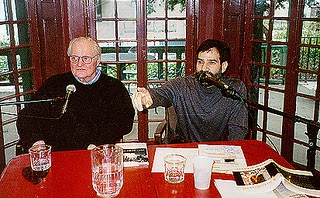Ideas elude one in a poem

"When one goes at ideas directly," he once said, "with hammer and tongs as it were, ideas tend to elude one in a poem. I think they only come back in when one pretends not to be paying any attention to them, like a cat that will rub against your leg." There he's circling around, but I'll note that (a) his topic is the circling-around of good writing, and (b) it's about as precise a way of describing his poem's relation to ideas as he could give.
Someone once said to him, "I remember having writing teachers insist, 'Write what you know!'" Ashbery's response: "But one doesn't know anything! That's the problem." What does it mean to know something? Still more tentatively: What does it mean to learn something?
As he put it once in a poem, in school all the thought gets combed out. In "What Is Poetry" — the title is not a question but the phrasal description of a category (and categorical problem) — he wonders if poetry is
Trying to avoid
Ideas, as in this poem? But we
Go back to them as to a wife, leaving
The mistress we desire? Now they
Will have to believe it
As we believed it. In school
All the thought got combed out:
What was left was like a field.